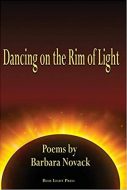 Barbara Novack
Barbara Novack
Dancing on the Rim of Light
Blue Light Press
Reviewer: Ann Wehrman
In Dancing on the Rim of Light, Barbara Novack captures and challenges her readers with seemingly modest poetry that reveals unexpected depth and meaning. Using down-to-earth language, readily accessible images, and references from daily life, Novack wields fearless, abstract poems that offer more than a pleasant escape via sumptuous images or a confidence boost by attesting to values that the reader might share. Perhaps in the tradition of Emily Dickinson, Novack’s writing seems deceptively simple, even aimless at first, but steadily the veil is pulled aside as Novack confronts the reader by gently, merrily posing deep questions and raising universal issues.
Dancing on the Rim of Light contains two sections, each preceded by an epigraph. Section One begins, “What country, friend, is this?” from Shakespeare’s Twelfth Night. Viola’s words in that play question the identity of a place, but one may also wonder what kind of country is this? Exploration, as well as social criticism, come to mind.
Novack’s first poem, “New World,” is direct and uncompromising; the speaker, in a subway, says,
New world
music bleeding from subway earbuds
trying to escape percussive souls
but soaring across the tracks …
. . .
New world
different ways to get to midtown
take the E, F, number 7
take a number, wait your turn,
take the train not traveled before.
. . .
New world
what was done
done done
needs undoing
to be redone
differently.
In the new world
possibility unsticks the cosmos
and the music of the spheres
soaks through
while cosmic rays sweep along the Milky Way
and the solar wind
blows high-masted ships
to unnamed shores.
The reader begins on relatively familiar physical turf, accompanying the speaker on a mundane trip uptown, but the journey unexpectedly takes on greater significance. The speaker now considers this world and far beyond, sailing the universe, exploring. What is the key that the speaker turns, the password to this magical ride? To Novack’s readers who have some experience of imagining or visiting other realms while still in this one, the trip may be achingly sweet. The poem makes a clarion call to create a new, better world.
Section One includes many personal poems, including some in which the poet writes of her parents. Her tone is sentimental yet still observational, philosophical, a bit removed. In “Aftermath,” Novack writes of surviving a loved one’s death, perhaps a parent, and the pristine images express the sadness and disorientation felt after losing a close family member:
You close that door
but don’t empty her drawers.
You turn the corner with quick steps
but don’t empty her closets.
You’re all right, you say
but you’re not.
Something stopped.
Clutter accumulates.
Cleaning waits.
Laundry piles.
You say, “In a while.”
There’s a scattering you hide,
a crumbling inside.
Your moorings gone.
The structure fell.
But you say,
“I’m doing well.”
On a more hopeful note, in “Holding Hands,” Novack skillfully compresses the entire universe into one point, that of two lovers joining hands:
the whole idea
of this alteration
change in
being
just by touch
is not actually
an idea
it is a blind-faith reaching
from darkness
to light.
Section One also features poems reflecting on disasters and current events, including 9/11 and Hurricane Sandy, and the poignant poem, “On Our Southern Border,” reminiscent of messages written by World War II concentration camp prisoners:
Held on our southern border
children
did not sink to the depths
of their captors
or hoped for despair;
instead
they made art
a mural
of soaring birds.
Section Two begins opens with the epigraph “Somewhere, something incredible is waiting to be known,” from Blaise Pascal. In this section, Novack narrows her focus, moving away from daily events and relationships to reflect upon the nature and meaning of writing.
In “64 Crayolas and the World,” she writes: “I wanted to draw the world / with the box of 64 Crayolas my father bought me.” Although her bullying classmate stole her crayons, Novack nevertheless still “had the colors / and . . . drew the world / with words.” She ends the book with the powerful, Zen-inspired, “Jisei: A Death Poem”:
What to say
when words have been my life?
They drift up like smoke
from a quenched fire.
Reading remains precious in the 21st century as it’s one of humanity’s perennial means of communication, a means of sharing wisdom and stories of all kinds. Reading offers the opportunity for deeper critical exploration of ideas than superficial, standard discourse creates. Opening a book, one plunges into a new experience, an adventure that can shake one to the base, change one’s view of life, teach powerfully. Digital, paperback or cloth-bound, a book holds the ticket. Novack’s pristine, courageous collection takes her readers on a journey that can enrich their minds, hearts, and inner worlds – value far beyond the price.

